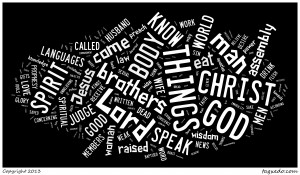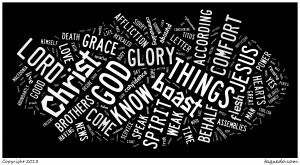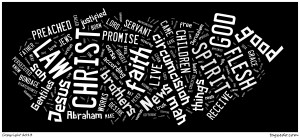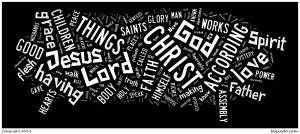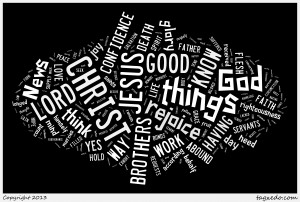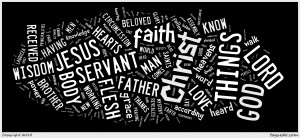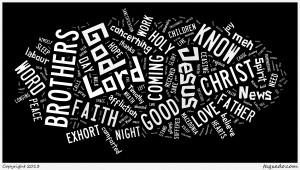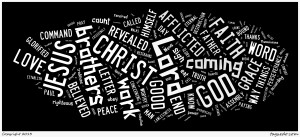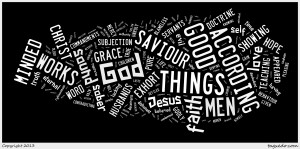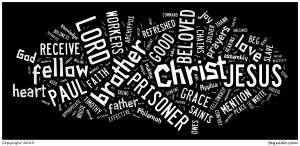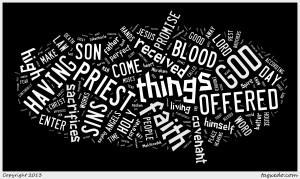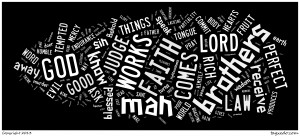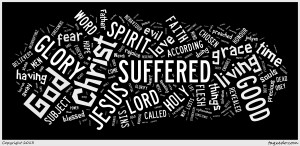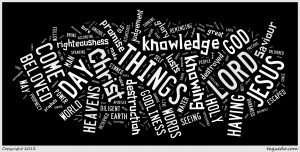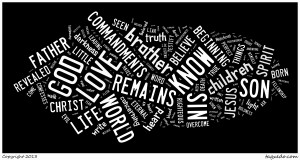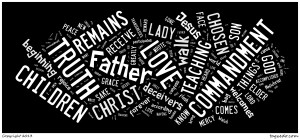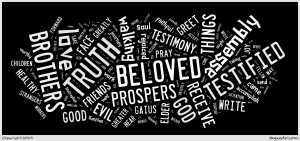I preached this message at Dawlish Methodist Hall on Sunday 8th April 2018.
Last week we celebrated Easter, the main Christian festival, where we remember Jesus’ death and resurrection. Our bibles tell us what happened a week later, and I want to start by reminding ourselves of that and the preceding story:
Mary Magdalene came and told the disciples that she had seen the Lord, and that he had said these things to her. When therefore it was evening on that day, the first day of the week, and when the doors were locked where the disciples were assembled, for fear of the Jews, Jesus came and stood in the middle, and said to them, “Peace be to you.”
When he had said this, he showed them his hands and his side. The disciples therefore were glad when they saw the Lord. Jesus therefore said to them again, “Peace be to you. As the Father has sent me, even so I send you.” When he had said this, he breathed on them, and said to them, “Receive the Holy Spirit! If you forgive anyone’s sins, they have been forgiven them. If you retain anyone’s sins, they have been retained.”
But Thomas, one of the twelve, called Didymus, wasn’t with them when Jesus came. The other disciples therefore said to him, “We have seen the Lord!”
But he said to them, “Unless I see in his hands the print of the nails, put my finger into the print of the nails, and put my hand into his side, I will not believe.”
After eight days again his disciples were inside and Thomas was with them. Jesus came, the doors being locked, and stood in the middle, and said, “Peace be to you.” Then he said to Thomas, “Reach here your finger, and see my hands. Reach here your hand, and put it into my side. Don’t be unbelieving, but believing.”
Thomas answered him, “My Lord and my God!”
Jesus said to him, “Because you have seen me, you have believed. Blessed are those who have not seen, and have believed.”
John 20:18-29 (WEB)
Just as the three days of Jesus’ in the tomb included Friday and Sunday, so eight days would normally designate the Sunday to the Sunday the following week. As such, today is the anniversary of when Jesus’ first appeared to Thomas.
I think Thomas unfairly gets a bad press over his so-called “lack of faith”. In fact, as a scientist, it seems perfectly reasonable to me that Thomas demands to see the “evidence” of his resurrected Lord before he is prepared to overturn his world view again. And let’s not forget that until Jesus’ resurrection appearances, the narrative had become that this was yet another dead Jew – a promising Messiah wannabe who had met the same end as the other Jewish revolutionaries in the preceding century. Thomas asks for no less than what the other disciples had been given: a personal encounter with the risen Jesus.
Before we consider what subsequently happened, it is worth spending a moment thinking about what isn’t written in that verse. All the disciples except Thomas see Jesus on that Easter Sunday, as well as some others such as Mary Magdalene. You can imagine the excitement as they tell Thomas, who is then pretty non-plussed that he has missed the big event. Thomas has to wait an entire week, before his wish is granted and he gets an audience with Jesus.
That must have been an excruciating time for Thomas. He must have struggled to share in their joy – left out, an outsider, who desperately wants to join the party, but who hasn’t had that same experience the other disciples had. Perhaps you would start to question yourself: whether you had done something wrong; whether you were ever really part of that inner circle; if you might be best letting the “chosen ones” get on with proclaiming the gospel while you just get out of the way. I can see Thomas battling against that despair, those feelings of inadequacy – but still hoping with whatever hope he has left that the rumours are true.
It is also a reminder to us of two things:
-
Our not-yet Christian friends may feel that same way – that they can’t share in our joy because they don’t feel included in our group; outsiders like Thomas for that short while. We need to be sensitive to that – not that we shouldn’t proclaim the truth of Jesus’ death and resurrection, and the invitation that is open to all to come see for themselves – but that we need to recognise that what we have experienced and are feeling is not yet what everyone else feels.
-
There are many times as Christians when we feel outsiders, inadequate, and we question whether we really belong in the same group as our other Christian acquaintances. Perhaps we don’t really feel we have a testimony; perhaps we see giftings in others that we don’t see in ourselves; perhaps like Thomas, we have those nagging doubts about whether we really have what it takes to be a Christian. I want to reassure you that God works in all of that – he doesn’t want scores of identikit Christians, who come fully formed from the same mould. God’s church is diverse and broad; your story is unique and it is as much a vibrant part of the collage of discipleship as anyone else’s.
Jesus did come to Thomas, full of grace and inviting Thomas to partake in his joy. Tradition asserts that Thomas proceeded to go further afield in preaching the gospel than any of the other disciples, travelling to India and the Far East, establishing churches that later missionaries were astounded to find still in existence many centuries later.
The story of Thomas, exemplifies the struggle and transformation each of the disciples went through, and each of us goes through in our own spiritual journey. Each of the disciples had known Jesus, had spent years under his tutelage, living and working alongside him. Many people were healed during that ministry, many heard Jesus’ amazing teachings – yet the bible tells us that still many turned away, and even the disciples were scattered and forlorn at Jesus’ crucifixion. It took an encounter with the risen Jesus to transform their lives; to turn them into not just hearers of the word, but martyrs prepared to give their lives for the sake of the gospel. That same truth remains today as the centrepiece of the Christian faith – for all Jesus’ inspired teaching, and miracles in his ministry on Earth, it is a personal encounter with the risen Jesus that has the power to transform lives.
Jesus final words to Thomas in this encounter are also encouraging to us, living two millenia later: “Blessed are those who have not seen, and have believed.” Christian history is littered with examples of people who have not seen, but have believed. From the earliest patriarchs in Genesis, through Moses who never entered the promised land, and David who paid for and drew up the plans for God’s temple in Jerusalem, but never got to build it. This week we celebrated the 50th anniversary of Martin Luther King’s death, who himself never got to see the emancipation of black people in America, but was certain it was coming. In his address, the night before he died, Martin Luther King told the assembled congregation:
“Well, I don’t know what will happen now. We’ve got some difficult days ahead. But it really doesn’t matter with me now, because I’ve been to the mountaintop. And I don’t mind. Like anybody, I would like to live – a long life; longevity has its place. But I’m not concerned about that now. I just want to do God’s will. And He’s allowed me to go up to the mountain. And I’ve looked over. And I’ve seen the Promised Land. I may not get there with you. But I want you to know tonight, that we, as a people, will get to the Promised Land. So I’m happy, tonight. I’m not worried about anything. I’m not fearing any man. Mine eyes have seen the glory of the coming of the Lord.”
“Blessed are those who have not seen, and have believed.”
The bible tells us more about what Jesus did between Easter Sunday and his ascension. Firstly, we are told that Jesus appears to many more people than just the disciples:
“he appeared to Cephas, then to the twelve. Then he appeared to over five hundred brothers at once, most of whom remain until now, but some have also fallen asleep. Then he appeared to James, then to all the apostles.”
1 Corinthians 15:5-7 (WEB)
That is quite some claim – Paul is effectively claiming that by the number of witnesses alone, Jesus’ resurrection is about as sure as anything can be – there are lots of people who saw him and everyone in Jerusalem knows someone who knows someone who saw Jesus risen.
But we are told also that Jesus wasn’t just popping up amongst people to prove that he had risen from the dead. In the opening verses of Acts we read:
“The first book I wrote, Theophilus, concerned all that Jesus began both to do and to teach, until the day in which he was received up, after he had given commandment through the Holy Spirit to the apostles whom he had chosen. To these he also showed himself alive after he suffered, by many proofs, appearing to them over a period of forty days, and speaking about God’s Kingdom.”
Acts 1:1-3 (WEB)
For forty days between his resurrection and ascension Jesus not only furnished many proofs of his resurrection, but continued to teach his disciples about the Kingdom of God.
That shouldn’t be a surprise to us because Jesus’ preaching in his ministry before Good Friday consisted almost entirely of preaching about God’s Kingdom: proclaiming its arrival and explaining its nature.
There has been much written and misunderstood about the Kingdom of God. According to Jesus’ own ministry, the Kingdom of God is not some far off utopia. Jesus’ message was urgent: “the Kingdom of God is at hand!” and even “the Kingdom of God is within you!”.
Jesus invites us to be people of the Kingdom, ambassadors for Him, the King, in our relationships with each other, in our relationships with not-yet Christians, in the way we live our lives as witnesses to His own resurrection power. Jesus’ Kingdom, whilst birthed violently in the defeat of death through Jesus’ resurrection on that first Easter Sunday, would be established on earth not by the sword, but through love. Jesus likened the growth of the Kingdom to a small amount of yeast working to rise a batch of dough. And it has been gradual: 50 years ago, Martin Luther King was assassinated for daring to hope that black Americans could have the same rights as white Americans. It took 1800 years for slavery to be abolished in the Western world. European empires that saw indigenous peoples denied their right to self-government crumbled only in the middle of the 20th century. We still have massive issues of gender discrimination in the workplace as the latest data published this week demonstrate that a significant majority of companies still pay women less than men for doing the same job.
“Blessed are those who hunger and thirst after righteousness, for they shall be filled.”
Matthew 5:6 (WEB)
Jesus’ message to us is the same message as he gives implicitly in that loving encounter with Thomas. Be transformed in me, your resurrected Lord and Saviour. You are among the people I have called to represent me to the world, and to usher in the Kingdom of God on earth.
Praise be to God!

 Follow
Follow
